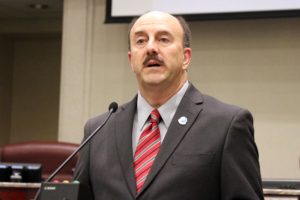 In 2004, Metro Chief Richard White predicted a “death spiral” for the Metrorail system due to chronic underfunding.
In 2004, Metro Chief Richard White predicted a “death spiral” for the Metrorail system due to chronic underfunding.
Federal and state budget disputes were preventing Metro from getting the $1.5 billion in maintenance investment it needed, leading White to warn of “a systemic service meltdown.”
Eleven years later, White’s prediction seems to be coming true. And he wasn’t the only one to see it coming.
“Right now, there’s no money for transportation funding in anyone’s budget,” Chris Zimmerman, who at the time served on both the Arlington County Board and the Metro board, told the Washington Post in 2004. “I’ve got a state government that’s happy to let everything fall into the toilet. And we’ve got local governments that have limited means to raise money. We’ve got nothing to work with.”
Zimmerman resigned from the Metro board in 2010, and stepped down from the County Board in 2014. Now serving as Vice President for Economic Development for the group Smart Growth America, Zimmerman shared some thoughts on Metro’s current woes during a phone interview with ARLnow.com.
 In 2002, Zimmerman and the Metro Board were actively seeking additional capital funding for Metro from Maryland, Virginia and the federal government — but to little avail. With inadequate funding, Metro wouldn’t be able to afford the track and station maintenance and new trains needed to keep the system running smoothly.
In 2002, Zimmerman and the Metro Board were actively seeking additional capital funding for Metro from Maryland, Virginia and the federal government — but to little avail. With inadequate funding, Metro wouldn’t be able to afford the track and station maintenance and new trains needed to keep the system running smoothly.
“It was foreseeable and it was foreseen,” he said of Metro’s problems today.
What would it take to fix the chronic system breakdowns that are causing long, frustrating commutes and chasing away riders? Zimmerman said it would take a lot more than that $1.5 billion figure sought in 2004 — and would likely require intervention by the federal government in the form of increased annual funding.
“What would actually make a difference is if [the federal government] would partner with our system… we have federal folks on the board but we don’t really have a federal funding partner,” he said. The feds have been providing funds to Metro for capital improvements, but Zimmerman argues that the level of funding doesn’t reflect Metro’s critical importance in helping the federal workforce in D.C. get to their jobs.
Many of the loudest voices speaking out about Metro are calling for management and culture changes within WMATA. Some of that may come from newly-imposed federal oversight of Metro, but management change alone isn’t a panacea, according to Zimmerman.
“There are clearly going to be management issues, but… the reality is you’re not going to get an organizational culture change when you’re chronically out of funds,” he said.
What’s possible with the right level of funding? Zimmerman cited New York City’s subway system as an example of a system that was poorly maintained for decades but which was turned around starting in the 1980s thanks to investment in maintenance.
“The New York subway wasn’t a great place for a lot of years and they turned it around with a lot of new investment,” he said.
There’s a bit of irony in the lack of funding for Metro, given that the system has helped to spur the kind of transit-oriented smart growth that has filled the coffers of local governments and made Arlington and D.C. more walkable and desirable places to live.
“We have proof that this is a worthwhile investment, and at the same time we don’t channel resources, the adequate resources into upkeep of the system, which we really should be doing,” he said.
Going forward, Zimmerman recommended that Arlington continue to push for Metro improvements and funding.
“Arlington should continue to advocate for the system, particularly more federal government investment,” he said. Still, even with maintenance investment, riders and policymakers should be prepared for things to get worse before they get better.
“You can see the affect of how many years of neglect — it runs, but it doesn’t run well, it has all kinds of problems,” Zimmerman said. “Things will continue to get worse for a long time.”
Hat tip to Benjamin Freed for this Washingtonian article. Photo (top) courtesy Rebekah Solem.

